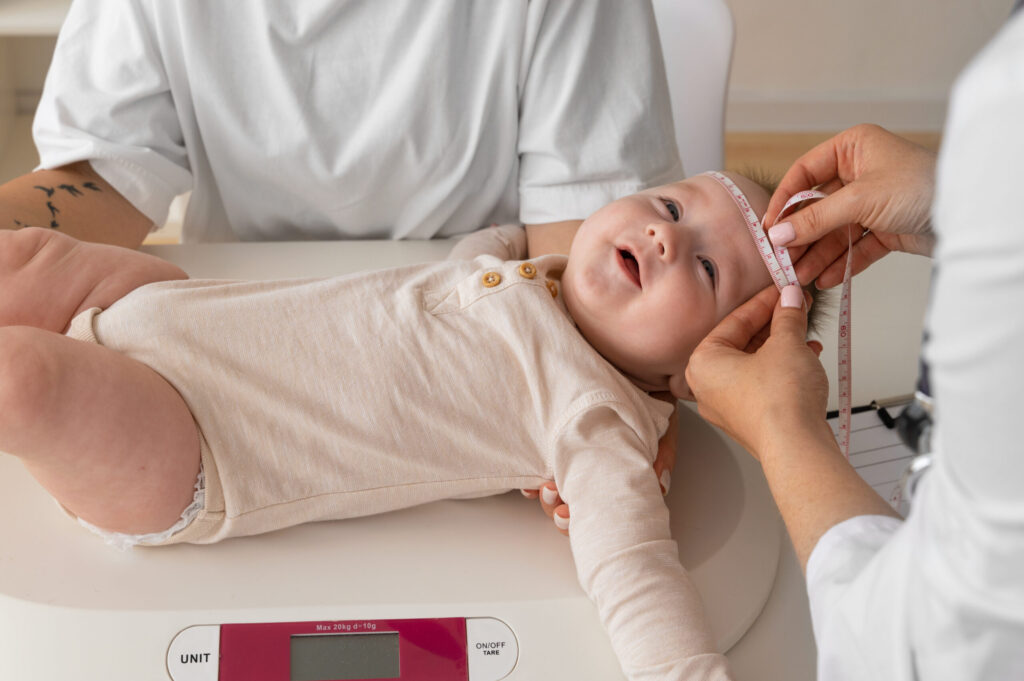Bringing a new baby home is a life-changing experience. Amidst the joy and excitement, ensuring their health is a top priority. Newborn screening is a critical first step in detecting serious conditions early before symptoms appear. According to the Centers for Disease Control and Prevention (CDC), newborn screening identifies over 12,000 babies each year in the U.S. with conditions that, if left undetected, could cause lifelong health issues. Early intervention significantly improves health outcomes, underscoring the importance of this essential screening.
What Is Newborn Screening?
Newborn screening is a public health program designed to identify rare but serious conditions that might not be immediately visible at birth. These conditions can be:
- Genetic – inherited disorders like cystic fibrosis, Down syndrome, etc.
- Metabolic – conditions affecting how the body processes nutrients, such as phenylketonuria (PKU)
- Hormonal – disorders like congenital hypothyroidism
- Functional – conditions affecting organ function, such as critical congenital heart defects (CCHD)
Most of these conditions have no obvious symptoms at birth but can cause severe complications if untreated. Early detection leads to timely intervention, helping prevent intellectual disabilities, growth issues, organ damage, or life-threatening complications.
The Screening Tests: What to Expect
Newborn screening typically includes three primary tests, conducted within the first 24 to 48 hours of life before hospital discharge:
1. Heel Prick Blood Test (Metabolic and Genetic Screening)
A small blood sample is collected from your baby’s heel to screen for over 30 to 50 conditions, depending on the state. This test helps detect disorders such as:
- Phenylketonuria (PKU): A metabolic disorder that, if untreated, can lead to intellectual disability. With early dietary intervention, children with PKU can develop normally.
- Congenital Hypothyroidism: A hormonal condition that, without treatment, can impair brain development and growth.
- Cystic Fibrosis (CF): A genetic disorder that affects lung and digestive function, where early treatment can significantly improve quality of life.
🔎 Fact: The U.S. Department of Health & Human Services (HHS) recommends screening for 35 core conditions, but the number varies by location. Ask your healthcare provider about your state’s screening panel.
2. Hearing Test (Newborn Hearing Screening)
A painless, non-invasive test uses soft sounds played through tiny earphones to assess your baby’s hearing function. Hearing loss affects about 1-3 out of every 1,000 newborns, and early detection is essential for speech and language development.
3. Pulse Oximetry (Critical Congenital Heart Defect Screening)
This simple, non-invasive test measures oxygen levels in the blood to detect serious heart conditions that might not be obvious during a physical exam. CCHDs occur in 1 in 100 births, and early diagnosis allows for life-saving interventions.
Why Is Newborn Screening So Important?
- Early Diagnosis is equal to Early Intervention: Conditions like congenital hypothyroidism can lead to irreversible brain damage if untreated, but with early treatment, children can grow and develop normally.
- Improved Health Outcomes: Screening allows for prompt treatment, such as dietary modifications, medication, or surgery, reducing disability and improving quality of life.
- Peace of Mind for Parents: Newborn screening helps rule out serious but silent conditions, giving parents confidence in their child’s health.
Without newborn screening, many of these conditions might not be detected until symptoms appear, often when it’s too late for the most effective treatment.
Understanding the Process and Results
After screening, results typically come back within a few days to two weeks. Here’s what parents should know:
- Normal Results: Most babies have normal screening results, meaning no concerns were detected.
- Abnormal (Positive) Results: A positive result does not mean your baby has the condition; it simply means further testing is needed to confirm a diagnosis.
🔎 Fact: Over 90% of babies who receive an initial positive result are later found to be healthy after confirmatory testing.
Parental Involvement: What You Can Do
- Stay Informed: Ask your healthcare provider about the specific conditions included in your state’s newborn screening panel.
- Follow Up on Any Abnormal Results: If further testing is recommended, don’t delay, early intervention is key.
- Understand the Limitations: While newborn screening detects many conditions, it does not test for every possible health issue. Regular pediatric checkups remain essential.
Frequently Asked Questions
- What is included in newborn screening?
Newborn screening typically includes a blood test to check for metabolic and genetic disorders, a hearing test, and a pulse oximetry test to detect heart defects.
2. How long does it take to get newborn screening results?
Results from the blood test are usually ready in about five to seven days. Your baby’s healthcare provider will inform you if there are any concerns.
3. What conditions do newborn screening tests look for?
The specific conditions vary by state but generally include metabolic, endocrine, and hemoglobin disorders, as well as cystic fibrosis and hearing loss.
4. Is newborn screening mandatory?
While highly recommended, parents have the right to refuse newborn screening. It’s important to discuss any concerns with your healthcare provider to make an informed decision.
5. What happens if a newborn screening test is positive?
A positive result means further testing is needed to confirm if your baby has a specific condition. Early follow-up ensures timely diagnosis and treatment.
Newborn screening is a vital tool in safeguarding your baby’s health. Detecting potential issues early opens the door to treatments that can prevent serious complications, allowing your child to grow and thrive. If you have concerns about newborn screening or your baby’s health, speak with your pediatrician or a genetic counselor for personalized guidance. Taking proactive steps can shape your baby’s health for a lifetime.



